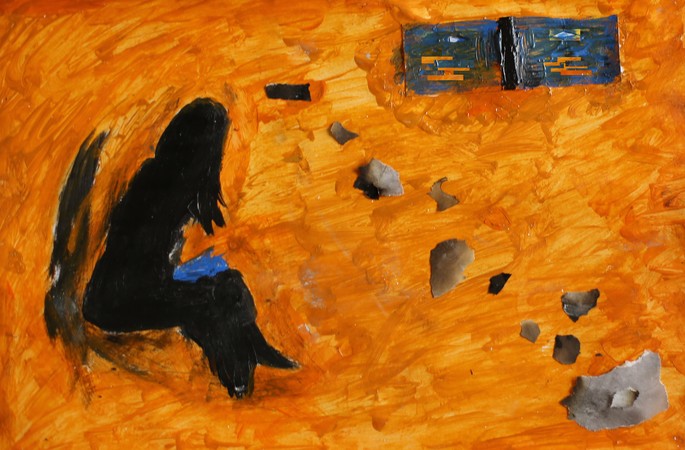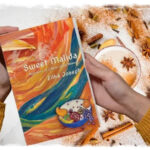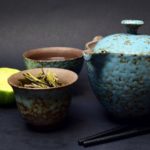Aliyah Daskal Painting- Acrylic on Paper by Ammar Aziz
Aliyah Daskal has a strange memory of a synagogue
In one of the narrowest streets of old Lahore:
The Star of David engraved on a brick wall
And a pipal sprouting from it
Whose leaves are bigger than the palms
Of her grandmother’s hands.
Aliyah Daskal’s mother had a twin sister,
Who was abandoned by their father
For marrying a Muslim:
A tailor, who claimed his ancestors
Were the royal rulers of Awadh.
Aliyah Daskal is a vegetarian
Who secretly wishes to taste brain masala.
She thinks of it more often than her dead fiancé,
Who worked as a Hebrew-Marathi translator
And always wanted to go to the Promised Land.
Aliyah Daskal grew up in Karachi
But it’s the summers in Lahore
At her aunt’s small house –
Built in the nineteenth century –
Where she discovered new flavours, new scents
And new sounds
Beyond the two languages she spoke at home.
Aliyah Daskal looks in the mirror
And feels sorry for her wrinkles
Which remind her of her grandmother
Whose skin always glowed
As if she knew the secrets
Not known to anyone else.
People sent their sick kids to her
Who were always healed within days
After she uncurled her hands
Over their heads.
Aliyah Daskal wants to visit Lahore
Even if the house is no longer there
Where they slept on the rooftop
And she always woke up
To the neighbour’s rooster crowing
Which her aunt thought had something
To do with the Muslims’ God.
Aliyah Daskal longs to be with a man.
So, she often walks alone
Wearing her best gown
In the crowded bazar
Which smells of meat
And where some kids always play
And fight.
She sometimes has chaye
From the open-air café
Where young men sit
And smoke all night.
Aliyah Daskal was once approached by a man
Who sold old objects
In a tiny basement shop
Where she would sometimes go
To buy half used fragrant candles
Imported from unknown countries.
The man who sat amidst wooden Buddha heads,
Vintage lamps and empty frames,
Holding a magnifying glass,
Examining an old prize-bond,
Invited her to have chicken dumchi
From a nearby stall –
She felt disgusted and did not respond.
Aliyah Daskal finds a bunch of film rolls
From her father’s drawer
And decides to get them developed
From the elderly photographer’s studio
Who has several painted cloth backdrops:
Larger-than-life flowers, European towers,
A landscape with a strange season
With snow in the sunlight,
In front of which families stand and smile –
She later changes her mind for no reason.
Aliyah Daskal has her father’s diary
That she rarely steps into.
It has folded letters between pages,
Some recipes,
That he must have noted down
While living alone,
And poems
That he wrote before the migration.
Aliyah Daskal thinks about migrating
Like all of her distant relatives
But feels at home in the city
Where everyday people kill each other
For linguistic differences
And corpses are found
Wrapped in sacks.
But there’s more to this city,
She always thinks,
Crossing the defunct railway tracks.
Aliyah Daskal does not like poetry
But is fond of using rhymes
In her daily conversations:
‘I want to go to Lahore.
Which is like my childhood whore’,
She laughs telling this to her colleague
Who smiles and gets back to her files.
Aliyah Daskal works at a women shelter home
Where everyone considers her a Christian.
Some young girls ask her if she’s a nun
Who is not allowed to be with a man.
Aliyah Daskal is sick of vegetables and lentils,
That she cooks each evening
Before taking a stroll in the bazar.
She sometimes brings out the recipe
That she found in her father’s diary
And reads it aloud:
“Boil the brain in water
For ten minutes.
Discard the water.
Remove the top lining on the brain…”
She pauses and starts again:
“Remove the top lining
On the brain
And chop it into small pieces.
Heat ghee and fry onion until light brown.
Add garlic, ginger, chillies.
Add the boiled brain
And stir-fry for a few minutes.
Add coriander and salt to taste.”
Aliyah Daskal wants to fulfil her fantasy
But is unsure about how to find a fresh brain.
She goes to the bazar,
Which smells like meat,
And starts looking for a clean shop
But the severed goat heads
Displayed on the wooden tables
Make her feel nauseous.
Aliyah Daskal looks around:
Boys are having tea.
The man who sells old things
Carries a big mannequin to a car.
Women are walking fast,
Looking for Elohim knows what.
Aliyah Daskal is a woman
Whose idea of a rebellion
Lies in a halal brain masala recipe
Noted down in a random diary
Of a man who has long been dead.
It’s not easy to be this woman.
Aliyah Daskal Prays In Quarantine
Aliyah Daskal starts her day by thanking God
For returning her soul to the body
After sleep,
What her mother referred to as momentary death.
This prayer is not supposed to have God’s real name: Adonai
For she has not washed her hands yet
And her mother deemed it improper to say His name
Before the washing ritual:
“Because you could touch something unclean,
Such as your genitals,
Or you could have impure dreams
While being asleep”, her mother had said.
So, once she’s purified, she will recite:
“Fear of Adonai is the beginning of wisdom”.
Aliyah Daskal goes to urinate
And later, she recites Asher Yatzar:
“Blessed are You, Adonai,
Our God,
King of the universe,
Who formed man with wisdom
And created within him many openings
And many hollow spaces.”
Aliyah Daskal makes chaye with a French toast.
She usually skips the prayers before meals
And says, ‘Bismillah’ instead –
A word her aunt had taught her in Lahore.
Aliyah Daskal picks up a random book
From her father’s sandalwood shelf:
‘You Didn’t Sow A Child In Me By Celia Dropkin’ –
She turns some pages and puts it back.
Aliyah Daskal switches on the television
And surfs the channels fast.
‘News channels are good at reminding you
About your futile struggles to survive’,
She recalls her widowed colleague saying that,
Whose husband worked as a public health reporter
And died of the pandemic, he denied.
Aliyah Daskal makes lentils with rice
And sits close to the window
In her 4th story flat:
People continue to commute:
Men wearing masks,
Women wrapped in scarves.
Everyone wants to reach somewhere.
Aliyah Daskal goes through her father’s diary:
Masala Dosa, Bhuna Khichuri, Kolhapuri potato curry –
All recipes are vegetarian
Except one
That she fancies certain nights.
Aliyah Daskal does not like her father’s poems
And wonders: why would he not use rhymes?
Indifferently, she begins to read one page:
“I don’t consider this afternoon to be a new beginning –
although that’s what they want me to believe
for the priest has washed away my sins –
what a drizzle always does to dusty leaves:
it leaves the dust moist
but never really washes it away.
The cacophony of my thoughts echo
in the silent chambers of her body
reminding her of my ugly existence
which wouldn’t let her sleep.”
Aliyah Daskal flips through the diary
And finds another poem:
“My neighbours belong to a sect
which mourn every year
for forty days
and then, there are days
in between
when they mourn again.
In the courtyard of their house,
they take care of a horse
who is chained and covered in black.
On certain nights,
they walk on coals
and use swords to slash
and whip their bare backs.
And here, locked in my room,
I imagine her bare breasts
and dwell on the days gone.”
Aliyah Daskal puts the diary aside
And recites: “Praised are You, Adonai,
My Lord,
And the Lord of my ancestors,
Who closes my eyes
In sleep,
My eyelids in slumber.”
She wonders if her mother had ever taught her a prayer
To heal the hollow spaces within
And if the brain masala recipe
Her father wrote
Is, in fact, a poem
Or can it be a poem
If she wants it to be a poem?



